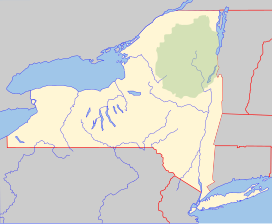
Back جبل مارسي Arabic جبل مارسى ARZ Mount Marcy BAR Mont Marcy Catalan Mount Marcy (bukid sa Tinipong Bansa, New York) CEB Mount Marcy Czech Mount Marcy German Mont Marcy French മൗണ്ട് മാർസി Malayalam Mount Marcy NB
| Mount Marcy | |
|---|---|
 Mount Marcy (Photo taken from Mount Skylight, looking north) | |
| Highest point | |
| Elevation | 5,343 ft (1,629 m) NAVD 88[1] |
| Listing | |
| Coordinates | 44°06′46″N 73°55′25″W / 44.112734392°N 73.923725878°W[1] |
| Naming | |
| Etymology | Named for William L. Marcy |
| Native name | Tewawe'éstha (Mohawk) |
| Geography | |
Location in Adirondack Park | |
| Location | Keene, Essex County, New York, U.S. |
| Parent range | Adirondack Mountains |
| Topo map | USGS Mount Marcy |
| Climbing | |
| First ascent | August 5, 1837, by Ebenezer Emmons and party[a] |
| Easiest route | Hike (Van Hoevenberg Trail) |
Mount Marcy (Mohawk: Tewawe'éstha) is the highest point in the U.S. state of New York, with an elevation of 5,343.1 feet (1,628.6 m). It is located in the town of Keene in Essex County. The mountain is in the heart of the High Peaks Wilderness Area in Adirondack Park. Like the surrounding Adirondack Mountains, Marcy was heavily affected by large glaciers during recent ice ages, which deposited boulders on the mountain slopes and carved valleys and depressions on the mountain. One such depression is today filled by Lake Tear of the Clouds, which is often cited as the highest source of the Hudson River. The majority of the mountain is covered by hardwood and spruce-fir forests, although the highest few hundred feet are above the tree line. The peak is dominated by rocky outcrops, lichens, and alpine plants. The mountain supports a diverse number of woodland mammals and birds.
Mount Marcy's stature and expansive views make it a popular destination for hikers, who crowd its summit in the summer months. Multiple approaches to the summit are available from the north and south, with the most popular route being the Van Hoevenberg Trail. The first recorded ascent of the mountain was made by a party led by Ebenezer Emmons[a] on August 5, 1837, who named it after New York governor William L. Marcy. One of the mountain's most notable ascents was made in 1901, when Theodore Roosevelt climbed it with his family, and learned during his descent that William McKinley was dying and he was to become President of the United States.
- ^ a b "The NGS Data Sheet". National GeodeticSurvey's Integrated Database. Retrieved June 22, 2020.
- ^ "Highest and Lowest Elevations". United States Geological Survey, United States Department of the Interior. Retrieved May 8, 2024.
- ^ "The Peaks – Adirondack 46ers". adk46er.org. Retrieved May 8, 2024.
Cite error: There are <ref group=lower-alpha> tags or {{efn}} templates on this page, but the references will not show without a {{reflist|group=lower-alpha}} template or {{notelist}} template (see the help page).

